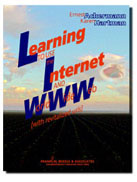| Summary Terms Exercises |
|
Chapter 4 |
|
|---|---|
Supplemental Material (available on CD included with book)
- Selected Directories and Virtual Libraries (PDF)
- Using Specialized Databases to Find Information About People (PDF)
- URLs from the chapter (HTML)
- Copies of the review questions in quiz format (PDF)
This chapter introduced different types of resources that help us find information on the World Wide Web. Directories, sometimes referred to as subject catalogs, are topic lists of selected Web resources, arranged in a hierarchical way. Directories differ from search engines in one major way: the human element involved in collecting the information and maintaining it. While search engine databases are created by computer programs, directories are created and maintained by people. Browsing directories can be a very effective way to find the resources you need, especially if you're sure where the information is located, but you're not quite sure how to narrow down a topic.
Virtual libraries are directories that contain collections of resources
that librarians or information specialists have carefully chosen and organized
in a logical way. Virtual libraries typically provide an organizational
hierarchy with subject categories to facilitate browsing. The main difference
between virtual libraries and directories is that virtual libraries are
much smaller because the resources included are very carefully selected.
The people who organize virtual libraries are usually on the lookout for
three major types of information resources: subject guides, reference
works, and specialized databases.
Specialized databases are searchable collections on particular subjects. The U.S. government and nonprofit organizations maintain many of the free, nonproprietary databases on the Web, but commercial databases are also starting to appear with greater frequency. You can usually find specialized databases by accessing virtual libraries and meta-search tools as well as by conducting a search in a search engine. These databases are like search engines in that they support different search features. Most databases have search instruction pages that you should read before you start searching.
Terms
| commercial
database directory hierarchy proprietary database reference work |
specialized
database subject category subject guide top-level category virtual library |
Exercises
Available on CD included with book.
This material has been prepared to accompany the book "Learning to Use the Internet and the World Wide Web" (ISBN 1-887902-78-3) by Ernest Ackermann and Karen Hartman, and published by Franklin, Beedle and Associates, Incorporated, Wilsonville, OR. © 2002. No part of this may be reproduced, stored in a retrieval system, or transcribed without permission of the publisher.
| You can help support this site by buying books, CDs, and other items after clicking on this link. |  |
Number of visits here since May 10, 2002.
